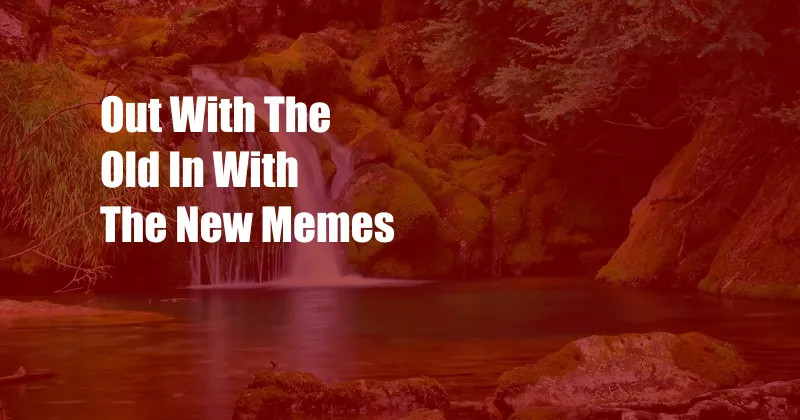
Out with the Old, in with the New: The Evolution of Memes
In the realm of digital communication, where ideas spread like wildfire, memes have emerged as a powerful force, shaping our online interactions and humor. From the iconic “Rickrolling” to the viral “Dancing Baby”, memes have become an integral part of our daily conversations, providing a shared language that transcends cultural and geographical boundaries.
But as with all things digital, the meme landscape is constantly evolving. New formats emerge, old ones fade into obscurity, and the meaning and significance of these viral artifacts shift with the times. In this article, we’ll explore the latest trends and developments in the world of memes, offering insights into their history, meaning, and impact on our social interactions.
The Rise of Video Memes
Traditionally, memes took the form of static images or GIFs, but in recent years, video memes have exploded in popularity. Platforms like Vine, TikTok, and Instagram Reels have become breeding grounds for these short, often hilarious clips that can capture our attention and spread like wildfire.
The rise of video memes can be attributed to several factors. Firstly, they offer a more dynamic and engaging experience, allowing creators to convey complex ideas or elaborate jokes that would be difficult to express in a static format. Secondly, video memes tap into our innate preference for moving images, capturing our attention more effectively than text or still images.
The Memeification of News and Current Events
Memes have also become an increasingly important tool for commenting on news and current events. By combining humor and satire, memes can simplify complex issues, spread awareness, or provide a critical perspective on the world around us.
For example, during the COVID-19 pandemic, memes emerged as a way for people to cope with the fear and uncertainty, while also criticizing government responses and promoting public health messages. This phenomenon highlights the power of memes as a form of social commentary, reflecting the collective experiences and perspectives of the online community.
The Role of Social Media in Meme Propagation
The proliferation of social media has played a pivotal role in the widespread adoption of memes. Platforms like Facebook, Twitter, and Reddit have become hubs for meme sharing, allowing users to connect with others who share their sense of humor and interests.
The rapid dissemination of memes through social media has also led to the emergence of microcelebrities known as “meme lords”. These individuals create and share highly popular memes that garner widespread attention and followers. The success of meme lords demonstrates the transformative power of social media in shaping online culture and the rise of new forms of entertainment.
Tips for Creating Successful Memes
While memes often seem like spontaneous creations, there are certain techniques and principles that can help you create successful and engaging memes. Here are a few tips to consider:
1. Know Your Audience: Before creating a meme, it’s important to understand your target audience. What kind of humor do they appreciate? What topics are they interested in? By catering to the specific interests and preferences of your audience, you can increase the chances of your meme resonating with them.
2. Leverage Current Events: Tying your meme to a trending topic or current event can make it more relatable and relevant. However, it’s important to ensure that your meme adds a unique and humorous perspective, rather than simply repeating what everyone else is saying.
Frequently Asked Questions (FAQs) about Memes
Q: What is the definition of a meme?
A: A meme is a unit of cultural transmission that can spread from person to person through various means, such as imitation, repetition, or social media.
Q: How do memes differ from traditional humor?
A: Memes are often more satirical and self-referential than traditional humor. They often rely on shared cultural knowledge and in-jokes within specific online communities.
Q: What are the ethical considerations surrounding memes?
A: It is important to use memes responsibly and avoid creating or sharing offensive or harmful content. Respecting copyright laws and crediting the original creators is also essential to maintain a healthy meme ecosystem.
Conclusion
The world of memes is constantly evolving, reflecting the ever-changing nature of online communication and popular culture. From the rise of video memes to their role in commenting on news and current events, memes have become an indispensable part of our digital lives. By understanding the latest trends and embracing the tips and advice shared in this article, you can become an active participant in the ever-evolving meme landscape, creating and sharing content that resonates with others and brings joy to the online community.
Are you interested in learning more about the fascinating world of memes? Join us on our social media channels for daily updates on the latest viral trends and engaging discussions with fellow meme enthusiasts.